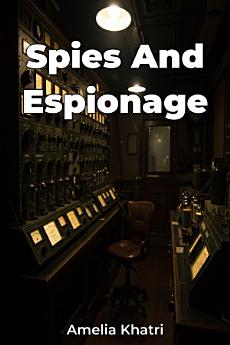Spies And Espionage
феб 2025. · Publifye AS
5,0star
1 recenzijareport
E-knjiga
73
Stranica
family_home
Ispunjava uslove
info
reportOcene i recenzije nisu verifikovane Saznajte više
O ovoj e-knjizi
Spies and Espionage explores the hidden world of intelligence gathering and its profound impact on 20th-century conflicts. Examining espionage as more than just information collection, the book reveals how it influenced critical political decisions and military strategies during events like World War II and the Cold War. It highlights the evolution of espionage tactics, from basic reconnaissance to sophisticated technological surveillance, emphasizing its decisive role in shaping historical outcomes. For example, codebreaking efforts at Bletchley Park significantly altered the course of World War II, showcasing the power of intelligence in military history.
The book progresses from foundational concepts like codebreaking and counterintelligence to detailed analyses of specific historical events. It investigates the role of spy networks on the Eastern Front and covert operations like the Berlin Tunnel, illustrating the complexities of secret operations.
Relying on declassified documents and personal memoirs, Spies and Espionage offers a balanced perspective on the methods, motivations, and consequences of espionage, making it valuable for history enthusiasts and those interested in international relations.
The book progresses from foundational concepts like codebreaking and counterintelligence to detailed analyses of specific historical events. It investigates the role of spy networks on the Eastern Front and covert operations like the Berlin Tunnel, illustrating the complexities of secret operations.
Relying on declassified documents and personal memoirs, Spies and Espionage offers a balanced perspective on the methods, motivations, and consequences of espionage, making it valuable for history enthusiasts and those interested in international relations.
Ocene i recenzije
5,0
1 recenzija
Ocenite ovu e-knjigu
Javite nam svoje mišljenje.
Informacije o čitanju
Pametni telefoni i tableti
Instalirajte aplikaciju Google Play knjige za Android i iPad/iPhone. Automatski se sinhronizuje sa nalogom i omogućava vam da čitate onlajn i oflajn gde god da se nalazite.
Laptopovi i računari
Možete da slušate audio-knjige kupljene na Google Play-u pomoću veb-pregledača na računaru.
E-čitači i drugi uređaji
Da biste čitali na uređajima koje koriste e-mastilo, kao što su Kobo e-čitači, treba da preuzmete fajl i prenesete ga na uređaj. Pratite detaljna uputstva iz centra za pomoć da biste preneli fajlove u podržane e-čitače.








